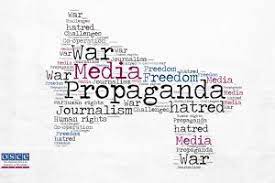Propaganda and the Media. 2022 Best

This paper explores Propaganda and the Media. Mass media can be used to sell political messages that focus on ideas and ideologies. But, the goal of a free press is to be the watchdog for the abuse of power and to counter that propaganda.
Propaganda and the Media.
Mass media can be used to sell political messages that focus on ideas and ideologies. But, the goal of a free press is to be the watchdog for the abuse of power and to counter that propaganda. When the government (or State) uses the mass media to further their own agenda, it is called propaganda. When a news organization undercovers corruption in the government, they are fulfilling their Constitutionally protected First Amendment function. However, not all propaganda is inherently bad. Consider the Mothers Against Drunk Driving (MADD) advertisements encouraging responsible behavior, for example.
Propaganda and the Media.
Respond to at least two of your colleagues’ postings in one or more of the following ways: Ask a probing question. Share an insight that you gained from having read your colleague’s posting. Offer and support a new opinion Validate an idea with your own experience Make a suggestion Expand on your colleague’s posting Post 1: The meaning behind propaganda has changed dramatically over the years. It can be sought out to be a good thing, or a bad thing. There can also be plenty of benefits and dangers to certain propagandas. Let’s start with the most recent definition of this term.
Propaganda and the Media.
Propaganda can be discovered in many forms, advertisement’s, entertainment, and even government purposes. In order for someone to really understand if something is beneficial or not to them requires each person to understand how something makes them feel and whether they agree with it or not. For example, take the “I want you” recruiting poster for the U.S army. This is a very compelling advertisement, and can be taken in different ways depending on each person. Someone may think, this is extremely powerful and want to take action immediately to help, so to them this would be considered beneficial.
Propaganda and the Media.
To someone else, it might come off as forceful, even scary, which to that person that would be considered a danger. One advertisement I personally think was extremely beneficial is the “We can do it!” poster created by Howard Miller in 1947. According to him, this poster was firstly to represent women working in the electrical field. But it started to be useful to support feminism in many ways. I personally take this image as being beneficial for women all over. It indicates how strong and powerful women are and can be.
It shows us that no matter our gender we can still strive for greatness and do whatever we deem fit for us. Jordan, C. (2019). 50 powerful examples of visual propaganda and the meanings behind them.
Propaganda and the Media.
https://www.canva.com/learn/examples-of-propaganda/ Mind Over Media. (2015). What is propaganda.? https://propaganda.mediaeducationlab.com/learnReferences to use Post 2: Propaganda is a form of communication aimed at influencing the attitude of a population toward some cause or position (Mind Over Media,2015). The benefits of propaganda encourage people to work together and improve strategic communication. Also, the positive impact of propaganda is its aim to influence attitudes and behaviors. However, there are dangers of propaganda, including deliberate system attempts to shape our perceptions and manipulate cognitions. https://youtu.be/oi9Ts_nvsvI
Propaganda and the Media.
It can use untrue information to accomplish its goal. “I’m Loving it, MacDonalds. I consider this slogan to be propaganda, and it is not a guarantee everyone will love eating MacDonalds’ food. Marc Hogan, 2016 mentions a motto to market and increase sales. In my opinion, it can be harmful to the public as it encourages people to eat more fast foods, which can cause threats to our health such as obesity when overeaten. Reference Mind Over Media. (2015). What is propaganda? https://propaganda.mediaeducationlab.com/learn Marc Hogan. (2016, July 14). The Contentious Table of McDonald’s.
Additional Files







